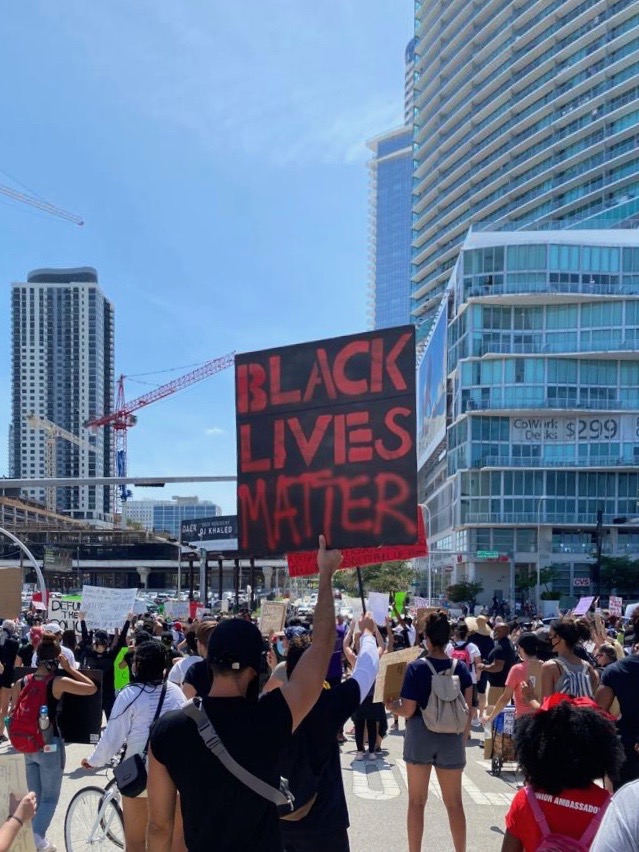We are living in grave, dire times. The last couple months, the national community has been rocked by the effects of the pandemic, COVID-19. Though the virus has taken many lives and affected each and every one of us in ways unprecedented, it has disproportionately affected and killed a large number of Black Americans. In the same breath, the Black community is burdened with more tragedy as the deaths of Ahmaud Arbery, George Floyd and Breonna Taylor have become widespread knowledge.
History has shown time and time again that all the Black people of this country, from the ones who learned their ancestry through their grandmothers and great-grandmothers to the ones building new foundations on this land, aren’t afforded the liberties they deserve as human beings and inhabitants of America.
George Floyd, who died on May 25, 2020, wasn’t afforded the right to prove himself innocent and lost his life in broad daylight under the knee and eyes of the Minneapolis Police Department. Ahmaud Arbery wasn’t afforded the right to run when he died on February 23, 2020 after two white men chased and shot him in Georgia, but news of his death was only made aware of publicly after a video of his death surfaced. Breonna Taylor died on March 13, 2020 after Louisville police in plainclothes barged in and shot her 8 times, once again denying her the right to defend herself.
Every year, there are too many new entries to the list of Black people who have died by the agents of white supremacy. It is all a chilling reality that in America, Black lives truly don’t matter.
There is nothing we can say that can accurately depict or express the hurt, trauma, pain and anguish the Black community is feeling right now. It’s an anguish that America has unfortunately passed on from generation to generation with their history of enslaving African peoples, colonizing Native and Black lands and cultivating a culture that exploits the lower socio-racial class. It’s a reality that many of us might have become aware of when we heard about the death of Trayvon Martin, or the death of Mike Brown, or the death of Sandra Bland or the deaths of countless more Black individuals.
But the trauma that Black folks have collected from living in a country rampant with anti-Black sentiments, from the very same institutions tasked with serving and protecting them, has yet again come to a boil. We’ve been in this spot so many times before and we’re here again. People are angry. People want justice.
The visceral reaction we’ve seen from people not only all over America, but in other parts of the world too — in the form of protests, whether peaceful or violent — is just that. It’s not people asking for justice, it’s them demanding that justice be given. In a land that boasts liberties, freedoms and democracy, it’s almost the people’s natural inalienable duty to mobilize and use their voices.
In this time, we all have a role to play in the reformation we hope will happen to this country. We support the people’s right to protest and to not be at the mercy of state-sanctioned weapons, and we are grateful for those willing to put their bodies on the frontline during a pandemic.
If you can’t be on the frontlines protesting, then we urge you not to only use your voice by addressing racism in your close work and social circles and doing digital activism, but to amplify Black voices. Listen to those who are hurting around you, empathize and find ways to help them. Use your platform to lift them up and bring them closer to justice.
And to the university, we call upon you to boldly name these troubling times for what it is — racism and rampant police brutality— and moving forward, to make a promise to not only increase the visibility and voice of Black students on campus but to place more Black professionals into teaching and administrative positions at the university. If you are truly committed to being a catalyst for change and healing, then put forth your resources into creating more scholarships for Black students so that they can attend and stay at the school, and making sure that Black students from the underrepresented communities in Miami enroll here. President Frenk and the administration have made a statement— now is the time to implement change.
What YOU can do RIGHT NOW:
- Don’t post photos and videos of protestors’ faces so that surveillance tactics aren’t used to unlawfully arrest them.
- Donate to bail funds around the country to help arrested protestors (Miami’s very own is through FEMPOWER).
- Call on state representatives to reform police tactics, sign petitions like this one for Breonna Taylor.
- Stay aware of any calls to action by ACLU Minnesota as they work to move the prosecution of George Floyd’s killer to their independent Attorney General.






